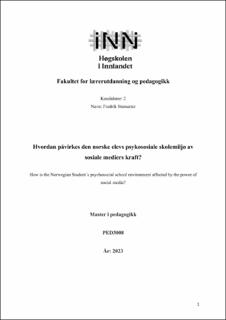Hvordan påvirkes den norske elevs psykososiale skolemiljø av sosiale mediers kraft?
Master thesis
Permanent lenke
https://hdl.handle.net/11250/3056782Utgivelsesdato
2023Metadata
Vis full innførselSamlinger
Sammendrag
Denne masteroppgaven skal belyse hvordan barn og unge i dag erfarer det psykososiale sosiale skolemiljøet. Den norske skolen fremmer med lover og regler en skole som står for helse, trivsel og læring. Klarer den norske skolen å fremme disse grunnsteinene ved siden av teknologiens inntog og sosiale medier i spissen. Utfordringene er mange og psykisk helse, depressive tanker og mobbing er sentrale faktorer ved unges identitetsutvikling. Prosjektet utforsker om hvordan elevene forstår og håndtere disse forskjellige utfordringene. Samtidig utforsker prosjektet hvordan skolen stiller seg med tiltak opp mot utfordringene. Prosjektets metodologiske ramme er en kvalitativ litteraturstudie, der tidligere empiriske studier blir undersøkt for å få en oversikt om hvordan dagens psykososiale skolemiljø blir erfart og forstått. Databasene for søkene ble foretatt gjennom Idunn og Oria. Søkegrensen for de inkluderte artiklene er fra år 2010 til 2022, og det ble sju artikler utvalgt som tilfører empiriske funn. Empiriske funn henviser at idealkulturen blant unge har endret seg og viser til at unge opplever et press for å leve det perfekte liv. Det perfekte liv blir fremstilt via influensere og kjente personligheter der unge opplever å bli sammenlignet, og blir påvirket både bevisst og ubevisst. Videre blir det henvist at psykisk helse og depressive tanker er et stort tema i skolen og for dagens ungdom, og kommer av mobbing og trakassering i forskjellige former. Digital dannelse blir også henvist som for mekanisk når det kommer til opplæring, og det tyder på at skolen til nå har for lite fokus på temaet. Disse empiriske funnene blir både sett sammen og mot hverandre i en diskusjon, og blir belyst ved hjelp av forskjellig teori som omhandler psykososialt skolemiljø. Oppsummert og samlet status rundt temaet hvordan norsk ungdom opplever det psykososiale skolemiljøet er at det trengs mer forskning. De empiriske funnene konkluderer forskjellig og viser ikke til et konkret sammensatt svar. Funnene viser til forskjellige hjelpemidler, men det er ikke sikkert om de sikrer både kunnskap og helsen til elevene i norsk skole.
Nøkkelord: Psykososialt skolemiljø, psykisk helse, mobbing, identitetsutvikling, dannelse og digital dannelse This master's thesis will shed light on how children and young people experience the psychosocial school environment. In conjunction with laws and regulations, the Norwegian school system emphasizes health, well-being and learning. Is the Norwegian school system able to promote these cornerstones alongside the introduction of technology and social media at the forefront? The challenges are many and mental health, depressive thoughts and bullying are central factors in the development of identity amongst young people. The project explores how students understand and deal with these different challenges. At the same time, the project explores what measures the school system take to approach the challenges.
The project's methodological framework is a qualitative literature study, where previous empirical studies are examined to get an overview of how today's psychosocial school environment is experienced and understood. The databases for the searches were made through Idunn and Oria. The search for the included articles is limited from 2010 to 2022, and seven articles were selected that add empirical findings.
Empirical findings indicate that the ideal culture among young people has changed and indicates that young people are experiencing pressure to live the perfect life. The perfect life is presented via influencers and famous personalities which young people compare themselves to, and are influenced both consciously and unconsciously. Empirical evidence shows that mental health and depressive thoughts are a major issue both in schools and for today's youth, and are a result of bullying and harassment in various forms. Digital education is also referred to as too mechanical when it comes to learning, and suggests that the schools so far had too little emphasis on the topic.
These empirical findings are both viewed together and put up against each other in a discussion, and are elucidated with the help of different theories that deal with the psychosocial school environment.
The summarized and overall status of the topic of how Norwegian youth experience the psychosocial school environment, is that more research is needed. The empirical findings conclude differently and do not point to a concrete conclusion. The findings point to various aids, but it is not certain whether they ensure both the knowledge and health of pupils in Norwegian schools.
Keywords: Psychosocial school environment, mental health, bullying, identity development, education and digital education
